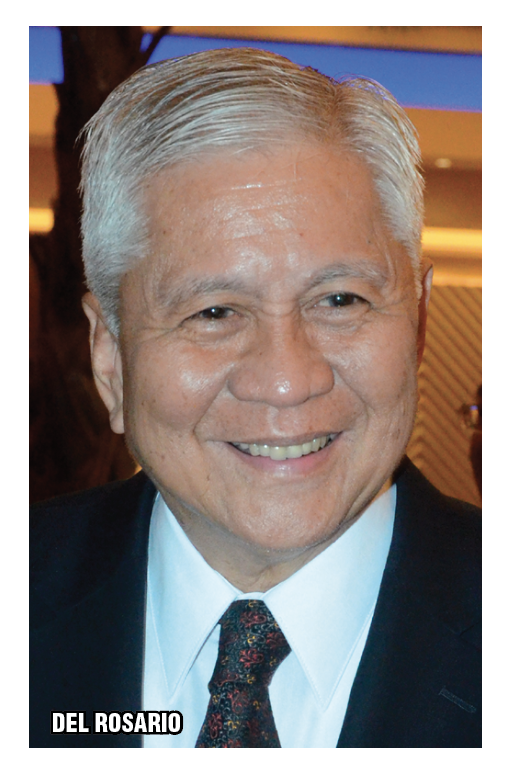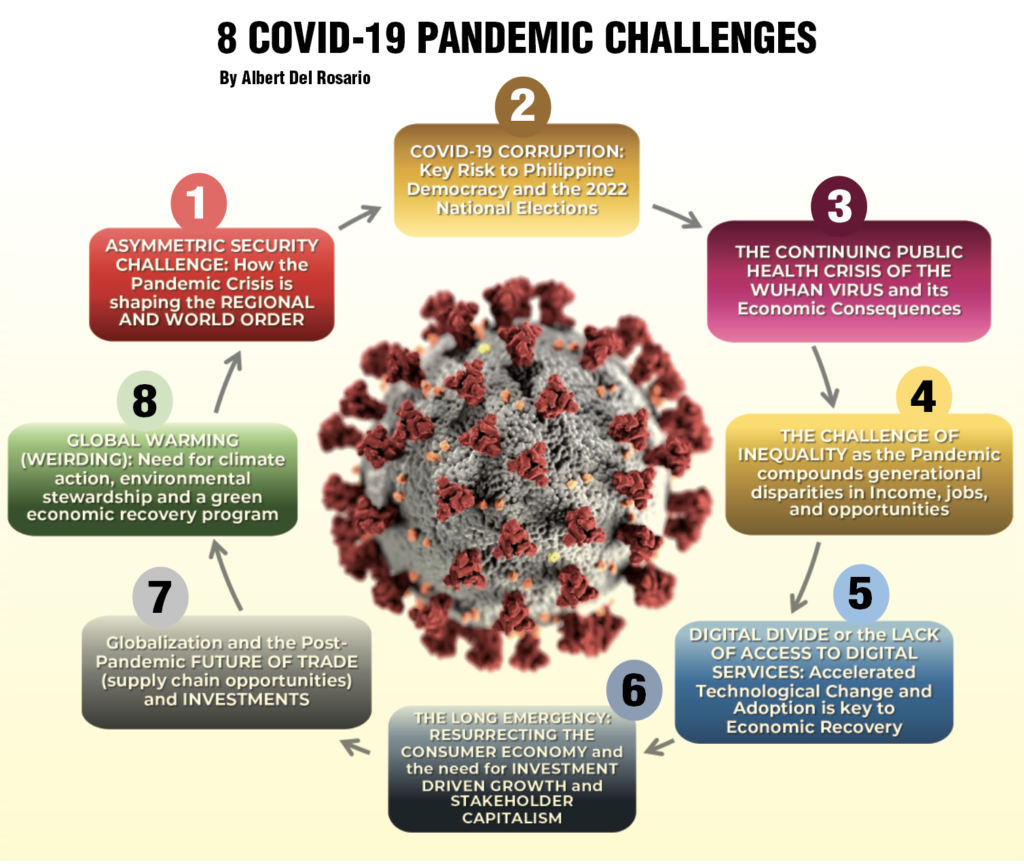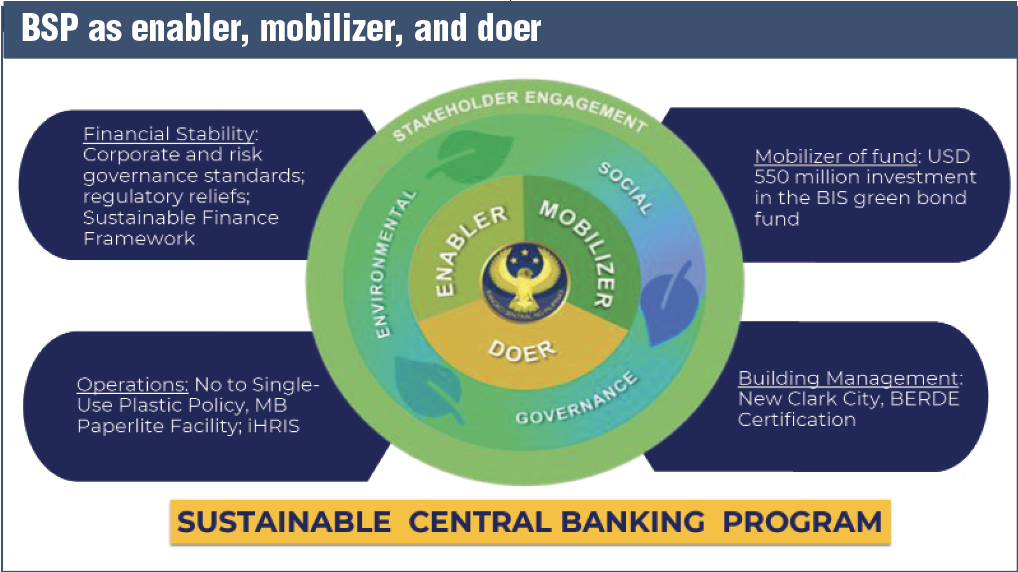Challenges for the next President: Pandemic, jobs, high prices of basic goods, corruption, alleviating poverty

SWS Survey: 82% of Filipinos believe that the growth of the Philippine economy will be accelerated if the government collaborates with the private sector.
“Private investors are seen to have the capacity to boost the Philippine economy by creating jobs, expanding livelihood opportunities, and helping uplift the lives of Filipinos out of poverty.”
— Ambassador Albert del Rosario
Former Secretary, Department of Foreign Affairs
Chair, Stratbase ADR Institute
(Opening remarks at the Pilipinas Conference, Nov. 22, 2021)
Good morning. Welcome to the Pilipinas Conference, which is running on its sixth year.
For the second time, we are coming together virtually to protect each other from potential risks brought about by the ongoing COVID-19 pandemic even if the number of new cases in the Philippines is going down.
This Pilipinas Conference is a platform that brings together thought leaders from civil society, the private sector, and the government for the purpose of sharing ideas, collaborating and having a genuine discourse across all sectors of society.
Our interest is to help civil society and the private sector find common ground with government. We want to facilitate the developmental collaboration of all of society so we can work together on sustainable solutions to matters of urgent concern for Filipinos. This we aim to do in the form of public policy, among others.

Bright spots
After spending almost two years under the cloud of a pandemic, we find bright spots emerging in the horizon that offer some hope in the near term.
Data from the Department of Health show that by mid-November, around 40% of the population has been fully vaccinated. Health officials are now also giving booster shots against COVID-19 to further insulate more sectors from the threat of transmission.
Earlier, the Philippine Statistics Authority (PSA) reported that the Philippine economy grew by 7.1% during the third quarter, albeit due to the low base in 2020.
As the number of new daily cases of COVID-19 has been declining, more sectors of the economy are now being opened up. This is a good first step towards economic recovery.
Then again, joblessness remains a problem in the country. Latest data from the PSA show that the unemployment rate in September 2021 increased to 8.9%—the highest since January 2021— which translated to 4.25 million jobless Filipinos.
Meanwhile, the underemployment rate eased to 14.2%, or 6.18 million Filipinos.
Extraordinary courses of action
Indeed, it is now clear that a holistic strategy with extraordinary courses of action is necessary to tackle the interconnected political and socio-economic challenges brought upon and magnified by this long and lingering emergency.
For one, the government must prioritize economic reforms and policies aimed at creating a favorable environment for businesses to prosper, trade to flourish, and investments to proliferate. With this kind of environment in place, a chain reaction will follow, thus boosting exports, generating more jobs, increasing consumption, and creating a stable income source for many people.
In fact, a survey that we recently commissioned to the Social Weather Stations (SWS) found that 82% of Filipinos believe that the growth of the Philippine economy will be accelerated if the government collaborates with the private sector.
Specifically, private investors are seen to have the capacity to boost the Philippine economy by creating jobs, expanding livelihood opportunities, and helping uplift the lives of Filipinos out of poverty.
Private sector confronts the health crisis
Interestingly, we have seen over the past two years the pivotal role of the private sector in confronting a public health crisis which quickly escalated into an economic downturn.
It has also gone beyond its operations to take into consideration the needs of its stakeholders to achieve a more inclusive growth. The private sector has, in fact, established itself as a reliable partner of government that will help in sustaining the economic gains we have achieved thus far.
However, instituting economic reforms and enabling greater participation for the private sector in recovery will not be the end-all.
This COVID-19 crisis has presented itself as an opportunity for the country to shift to a nature-oriented and circular economy in order to reduce the detrimental impact of climate change and to encourage the proper utilization of natural resources.
In other words, a green economic recovery will not only bring back the economy to its former strength. It will also conserve the natural environment we live in.

Strengthen ties with the international community
There is also a need for us to strengthen our ties with the international community in solving existing and emerging security threats, including climate change, cybersecurity and the COVID-19 pandemic.
We should not only form a stronger and more responsive foreign and security policy but be instrumental as well in maintaining a rules-based international order.
Lastly, there is a need for democratic renewal and strengthening of the rule of law. Over the past five and a half years, we have seen the emergence of strongman populism, corrosive investments, and COVID-19 corruption.
All these have undermined our democratic values of transparency, accountability, rule of law, and the active participation of citizens in the governance process.
These are further aggravated by the pervasiveness of disinformation and misinformation, which have, ultimately, contributed to divisiveness.
Priorities for the next leader
The country’s next leadership should prioritize issues such as the mounting private investors are seen to have the capacity to boost the Philippine economy by creating jobs, expanding livelihood opportunities, and helping uplift the lives of Filipinos out of poverty. These can be achieved if we all come together in unity and strive towards a common goal.
Our commissioned SWS survey found that the top issues that should be addressed by candidates running for national positions in the May 2022 elections are controlling the prices of basic services and commodities, providing jobs, eradicating graft and corruption in government, increasing the wages of workers, and reducing the poverty of Filipinos.
I hope that our next leaders will commit to tackling these pressing issues for us to achieve a more inclusive recovery. Then again, it will only be through a collective effort that our present political, economic and social conditions could be improved.
This being our last Pilipinas Conference before the May 2022 elections, it is our hope that we will be able to contribute to the relevant discourse and encourage healthy debate and intensive collaboration across all sectors of society.
On behalf of Stratbase ADR Institute led by its president, Prof. Dindo Manhit, I am delighted to welcome everyone to this annual Pilipinas Conference.
READ FULL ARTICLE HERE:
